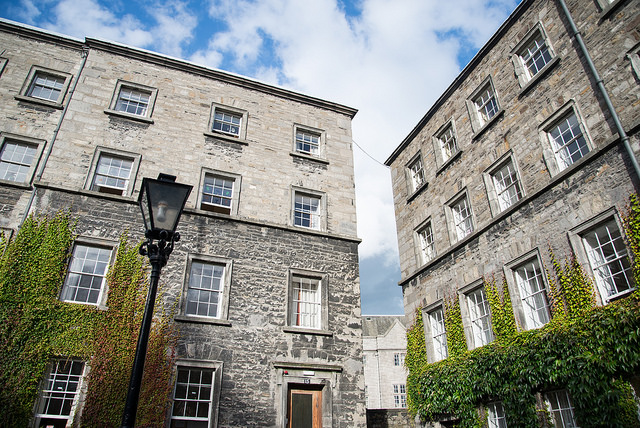On-campus accommodation offers this year ignored many students’ society or sports club involvement, in favour of a random allocation system that Trinity seemingly failed to communicate to applicants.
Many rooms on campus were this year awarded randomly to incoming final-year students, The University Times has learned, marking a significant departure from a system many applicants understood to be based largely on contributions to campus life.
In an email to one student, seen by The University Times, the Head of Accommodation in Trinity, Antony Dempsey, said: “Because of the number and scale of sports clubs and societies in Trinity and because of the number of students active in their administration, it is no longer possible to allocate rooms to all such students.”
“This year random allocation has taken place for rising final-year students”, he said.
In the email, Dempsey explained that the allocation of rooms was carried out by matching application numbers against random numbers generated by website Random.org. The site, which was developed by Dr Mads Haahr of Trinity’s School of Computer Science and Statistics, promises “true random numbers to anyone on the Internet”. The service states that people use it for lotteries, sweepstakes, online games and for scientific applications.
In an email statement to The University Times, Dempsey said that involvement in sports clubs and societies was not the only factor considered in the past.
“In previous years, there had been some significant criticism of the selection methods and questions had been raised about the relative importance of different offices in clubs and societies of different sizes”, he said. Dempsey also said that random allocation was used in previous years when demand was too high among students “of equal standing”.
Dempsey said that students nominated by the Central Societies Committee (CSC) and Dublin University Central Athletic Club (DUCAC) gained “recognition in the room allocation process”. Those nominees, he said, “are allocated rooms”.
The new system was recommended by a working party, established by the Dean of Students, Kevin O’Kelly, which included Trinity College Dublin Students’ Union (TCDSU) President Kevin Keane and Graduate Students’ Union (GSU) President Shane Collins.
The report is set to be discussed by the Student Life Committee. In an email statement to The University Times, Keane acknowledged that the new system hadn’t fully achieved its aims.
“I share a lot of the concerns around the introduction of random allocation of on campus rooms. It is extremely frustrating, when you are involved heavily in college life, to see students who aren’t nearly as involved getting on campus accommodation.”
Keane said the new system was about creating “transparency”. “In the allocation of rooms, it is important not to reserve them exclusively for those who have excelled socially and academically in college- we should all have the opportunity, or at least the potential, to live on campus”, he said.
Keane called for an approach that balanced “rooms allocated transparently and fairly for students who are heavily involved, and some rooms randomly allocated to final years to facilitate a diversity of experiences”.
The random allocation system is a significant change in the approach Trinity takes to on-campus accommodation and took place this year despite students being asked in their application to “state relevant grounds to support your application and also list briefly your hobbies and interests”.
Dempsey did not respond to a question about whether the altered system was communicated to students before applications opened.
In previous years, students have applied on the basis that those who are prominently involved in campus life, including in societies, sports clubs and the students’ union, will be looked on favourably for campus accommodation.
Many third-year students who failed to secure accommodation were angered by the allocation process.
In an email statement to The University Times, former Chair of DU Caledonian Society Naomi Foale, said: “Living on campus is a privilege, it is more than just a roof for a year. To decide the administration will be a lottery undermines that status. It removes meritocracy from the system and suggests student contributions to college life are not valued.”
Other students called the decision “nonsensical” and warned it might discourage people from getting involved in extracurricular activities. “The truth is that college life outside the lecture theatre kind of lives and dies by these people”, Rory Nichols, club and first team captain of Dublin University Hockey Club (DUHC), said in an email statement to The University Times. Nichols is also a sports scholar, and has told The University Times that a room on campus is vital to him if he is to maintain his role as DUHC captain next year.
“It’s like college are taking them for granted”, he added.
The cost of on-campus accommodation rises significantly each year. Rent for the Graduates Memorial Building, Front Square, Botany Bay and New Square reached €7,792 for 2018/19. However, there is still always a high demand for rooms on campus, with many students putting considerable effort into their applications.
“This year it led to a lot of people questioning what their system was – and to be honest I do wonder what the accommodation office’s priorities are. I think they definitely need to be much clearer and more explicit in future years as to what they’re basing the room allocations on. If it’s a random system, that’s fine, but people need to know that from the outset”, incoming Treasurer of Trinity Law Society and incoming Secretary of the Voluntary Tuition Programme (VTP), Aoife Curtin, told The University Times in an email statement.
Curtin, who also directed Jailbreak this year, said: “I really don’t think that that email should have been sent out right at the start of exams. Students are under enough stress as it is – they don’t need the accommodation office adding to that as they walk into the RDS.”
Donal MacNamee also contributed reporting to this piece.







